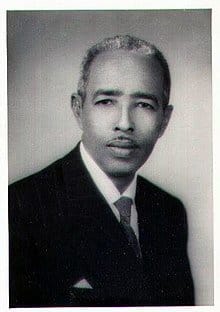In the vast story of Africa’s liberation and state-building, few names shine with as much quiet dignity as Aden Abdulle Osman Daar, the first President of Somalia. In an era where strongmen dominated post-colonial Africa, Aden Abdulle stood out as a rare figure: a leader who believed deeply in democracy, peaceful transition of power, and the ideals of African unity.
Born before the great waves of decolonization, he would live to see Somalia’s independence and lay the foundation stones of its early national dream.
Early Life: A Son of Somalia’s Heartland
Aden Abdulle Osman was born in 1908 in Beledweyne, a town along the Shabelle River in central Somalia. Raised in a society rooted in clan traditions and Islamic scholarship, Aden grew up understanding the intricate social fabric of Somali life.
During the colonial era, Somalia was divided among European powers: Italy controlled the south (Italian Somaliland), Britain the north (British Somaliland), and France the area now known as Djibouti (French Somaliland). Aden witnessed the fragmentation and foreign domination of his homeland, and it shaped his political consciousness early on.
Without extensive formal education (colonial powers often restricted education to keep Somalis under control), Aden educated himself and rose through community leadership and anti-colonial activism.
Political Awakening: Champion of Somali Unity
In the 1940s, as winds of change blew across Africa, Aden became a founding member of the Somali Youth League (SYL) — Somalia’s first and most important nationalist political party.
The SYL’s platform was clear:
End colonial rule.
Unite all Somali territories (“Greater Somalia”) scattered across neighboring Ethiopia, Kenya, and Djibouti.
Build an independent, sovereign Somali state based on democratic principles.
Aden rose quickly through the SYL’s ranks due to his intelligence, humility, and deep respect among Somalis of different clans — a critical trait in a society where clan rivalries could make or break leaders.
Somalia’s Independence and Historic Presidency
After years of struggle, July 1, 1960, marked Somalia’s birth as a united independent nation, merging the former British Somaliland and Italian Somaliland.
Aden Abdulle Osman was elected by Parliament as the country’s first President, defeating other prominent nationalists such as Haji Bashir Ismail Yusuf. He became Africa’s first democratically elected head of state.
As president (1960–1967), Aden oversaw:
The drafting of Somalia’s first constitution.
The building of national institutions: schools, police, courts, and the army.
Efforts to create a Somali identity beyond clan loyalties.
Peaceful and diplomatic foreign policies, including Somalia’s early membership in the United Nations, African Union (then OAU), and Arab League.
Unlike many African leaders who declared themselves “presidents for life,” Aden insisted on constitutionalism and regular elections.
A Rare Act: Stepping Down Peacefully
In 1967, Somalia held its first contested presidential election. Aden Abdulle faced his former Prime Minister, Abdirashid Ali Sharmarke, in a close and heated contest.
Aden Lost and Accepted defeat gracefully
In a continent where many leaders clung to power at all costs, Aden’s peaceful handover was hailed across Africa as a symbol of democratic maturity.
He set a gold standard few others matched: that leadership was a trust from the people, not a permanent right.
He famously said:
“I have lost the presidency, but I have won the respect of my people and the respect of Africa.”
Later Years: Voice of Wisdom Amidst Turmoil
After leaving office, Aden remained a respected elder statesman. He lived modestly, offering advice but staying out of daily politics.
When Somalia collapsed into dictatorship (after the 1969 coup led by Siad Barre) and later into civil war, many Somalis looked back with nostalgia at the “golden age” of Aden’s rule — a time of law, order, and dignity.
He died on June 8, 2007, at the age of 98 in Nairobi, Kenya, after a lifetime of service.
Unique Facts About Aden Abdulle Osman
First in Africa: He was the first democratically elected president on the continent and the first African leader to voluntarily and peacefully hand over power after losing an election.
Modest lifestyle: He retired without great wealth, living simply, without the corruption that plagued so many other leaders.
Pan-Somali Advocate: Aden remained a strong supporter of Pan-Somalism—the dream of uniting all Somali-inhabited lands—but always through peaceful and diplomatic means.
Respected Across Clans: In a deeply clan-based society, Aden’s reputation for fairness allowed him to rise above clan politics, a nearly impossible feat in Somalia’s history.
Aden Abdulle in African Context: A Light of Democracy
In the same era as giants like Patrice Lumumba, Kwame Nkrumah, Thomas Sankara, and Gamal Abdel Nasser, Aden Abdulle represented a different but equally vital tradition: constitutional democracy, peaceful transitions, and respect for the rule of law.
While others fought revolutions and wars, Aden proved that African sovereignty could also be achieved and preserved through diplomatic means, statecraft, and civility.
His leadership offers lessons still desperately needed in today’s Africa and beyond.
The Gentleman President
In a time when power often corrupted, Aden Abdulle Osman Daar remained true to the ideals of public service, humility, and democracy. Somalia’s early peaceful years, though short-lived, bear the mark of his wisdom.
He was not just Somalia’s first president; he was one of Africa’s first true democrats.
Today, in the dreams of a stable, united, and peaceful Somalia, Aden Abdulle’s spirit still whispers:
“Leadership is service, not domination.”



